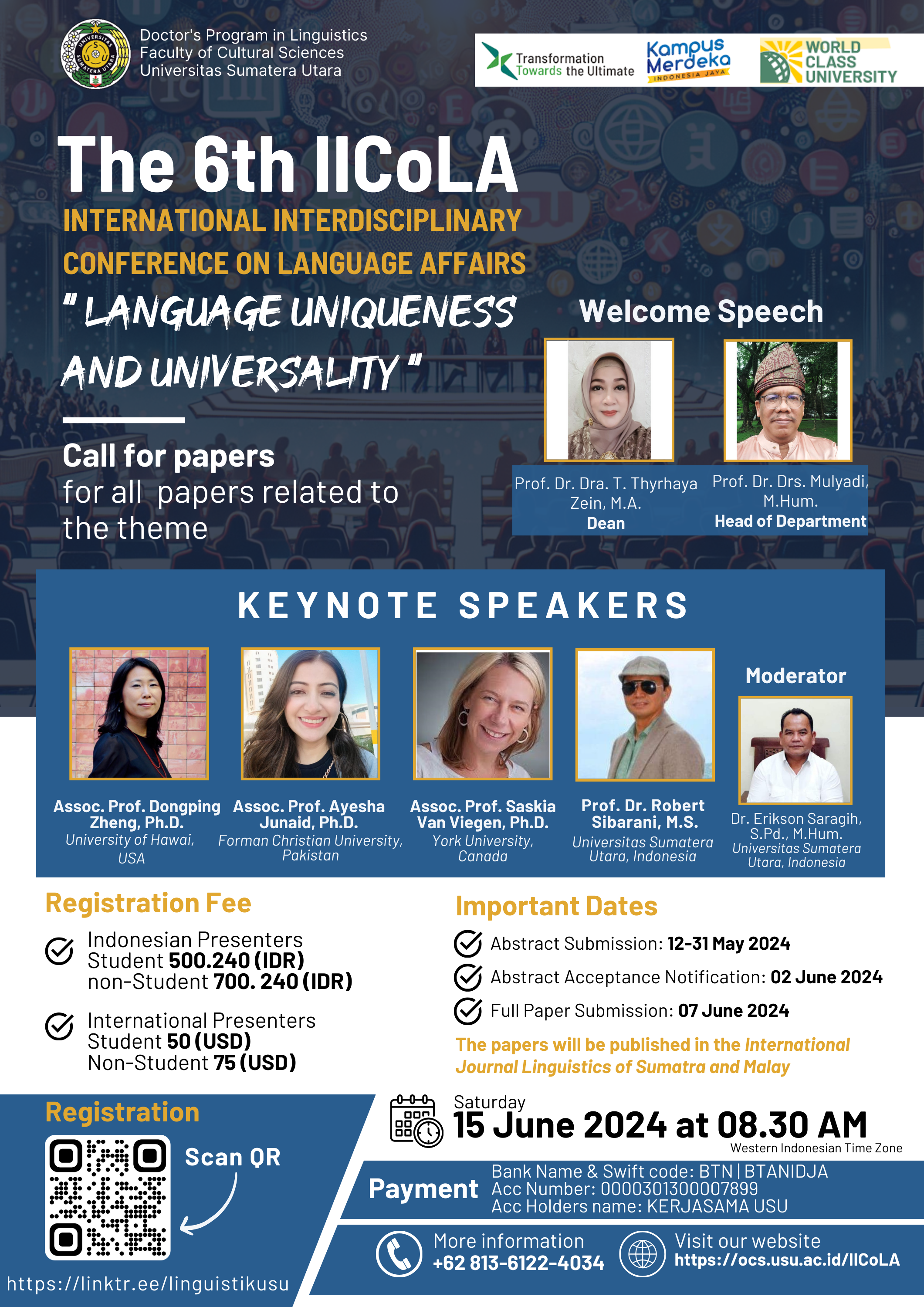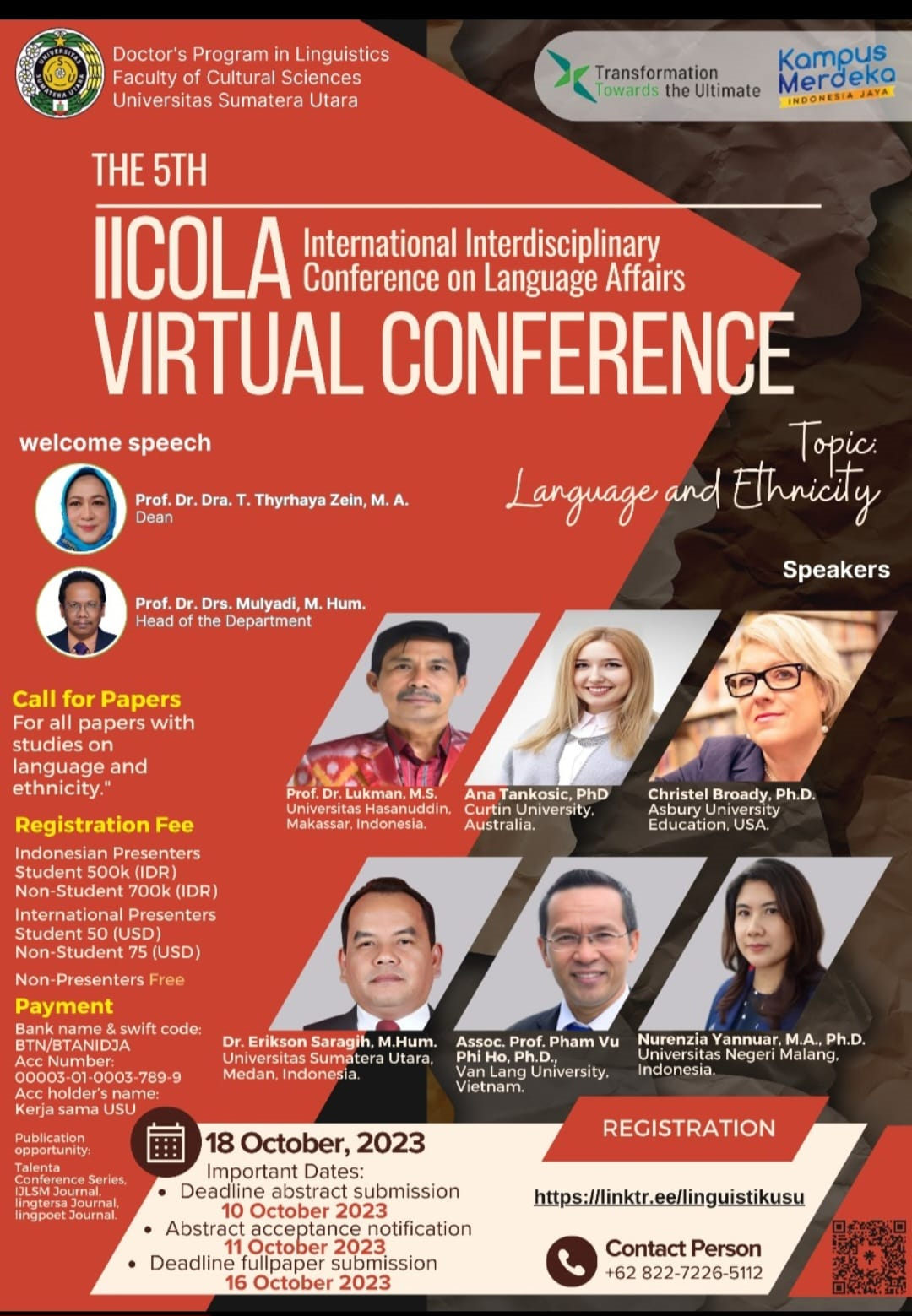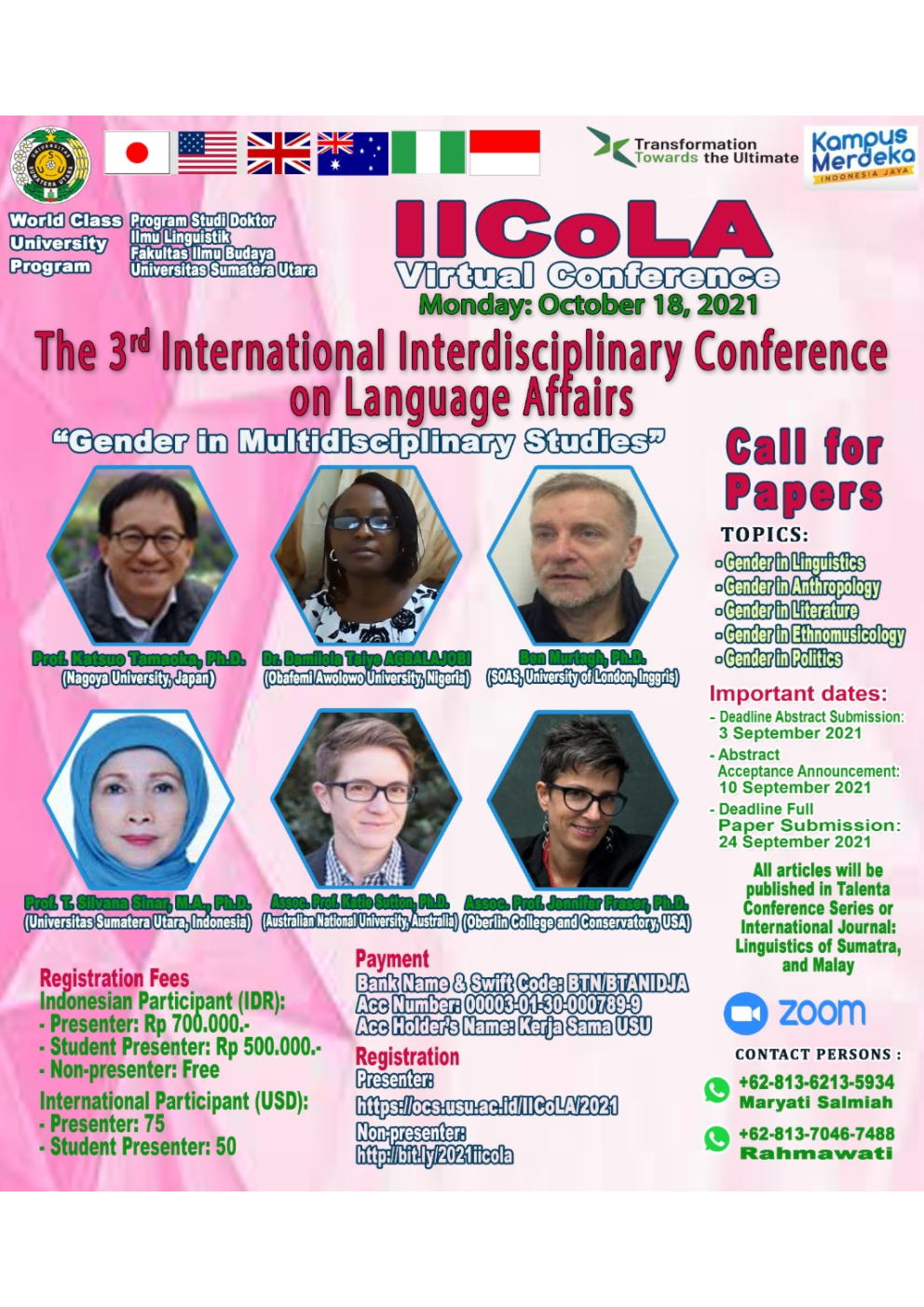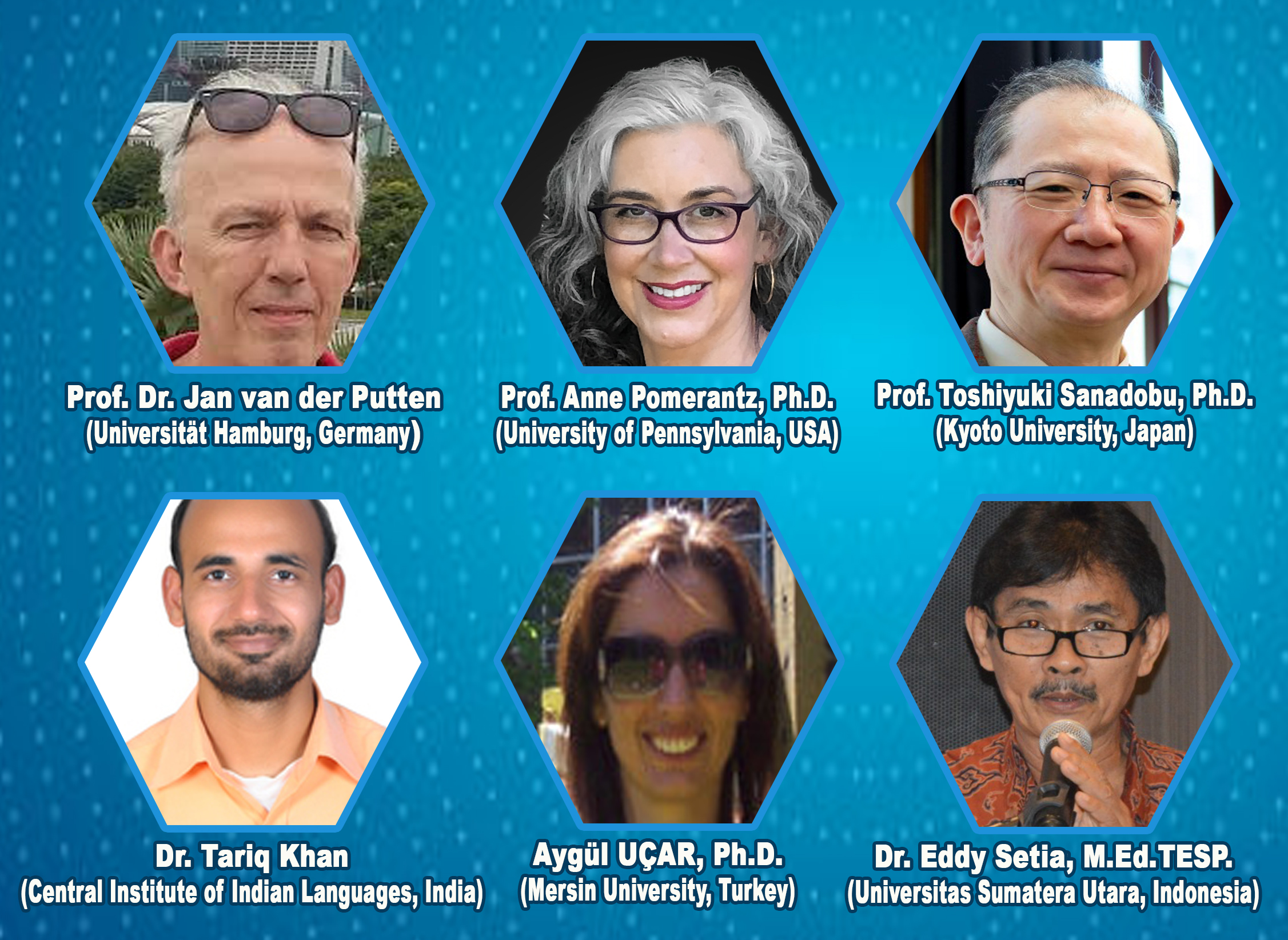Conference Archives
THE 6TH INTERNATIONAL INTERDISCIPLINARY CONFERENCE ON LANGUAGE AFFAIRS (IICOLA)
May 19, 2024 – May 20, 2024

THE 5Th INTERNATIONAL INTERDISCIPLINARY CONFERENCE ON LANGUAGE AFFAIRS (IICoLA)
October 18, 2023 – October 18, 2023

THE 4rd INTERNATIONAL INTERDISCIPLINARY CONFERENCE
ON LANGUAGE AFFAIRS (IICoLA)
“Language and Ethnicity”
A. Introduction
Public concerns and perceptions of “ethnic language’ seem messier and more multi-faceted than current methods and concepts disclose. The study of language and ethnicity has social and psychological dimensions that require interdisciplinary analysis and innovative methodological inroads – yet the vast majority of research in this area has lacked such ambition.
In this conference topic, the speakers will review, from an interdisciplinary perspective, literature on everyday ethnic languages that has so far gone unexplored by those scholars interested in the topic. There is a large and rapidly expanding body of ethnic language research (see Davidson et al. 2003); however, only recently have scholars begun to build an understanding of the ethnic language experience during the course of their day-to-day lives. One of the largest studies of real-life ethnic language involved a series of surveys that focused on describing the probabilities of experiencing certain ethnic language in everyday life and on the socio-demographic and situational factors that influence these probabilities (Scherer et al, 2002). The body of work on everyday emotions has also encompassed studies in psychology (Frijda, 1986), a number of ethnographic studies concerned with ‘how ethnic languages researched’ (Katz, 1999) how they are ‘managed’ across the settings of everyday life (Hochschild, 1983) and the development of a diverse ‘ethnic language concept’ (Kemper, 1990; Wouters, 1992; Williams and Bendelow, 1998). These contributions are noteworthy; not least because they offer a conceptual vocabulary that may well have much to offer social research, but also because they address pertinent methodological questions concerning research on emotions and therefore place a significant emphasis on ensuring the ecological and external validity of results.
These studies of ethnic languages particularly in Indonesia have not only provided rich and valuable data but have also developed a constructive discussion of both methodological and theoretical issues. Such issues are pertinent to the study of the fear of crime since they may help us to formulate a more comprehensive picture of what fear of crime actually is as a lived experience. This topic begins with a short review of the conceptual and methodological problems within the fear of crime literature, before considering the different perspectives on emotion which have emerged more recently. We assess how a multi-disciplinary analysis might facilitate a more theoretically and methodologically robust interpretative framework. Lastly, the conference outline how new methodological techniques employed by researchers studying everyday emotions might be employed to go ‘back to basics, as it were, to assess what fear of crime measures are actually measuring.
B. Objectives
Based on the effort to create a section for the development of science, particularly in language, the objectives are:
- To expand the Linguistics Program's perception at Universitas Sumatera Utara Faculty of Cultural Study about ethnic language study as a linguistic phenomenon.
- To examine language, culture and history, literature, psychology, communication, and politics that are linked to language and ethnicity.
- To build synergy from various fields of study in studying language and identity.
C. Primary Speakers
- Christel Broady, Ph.D, (Asbury University, USA)
- Ana Tankosic, PhD (Curtin University, Australia)
- Prof. Pham Vu Phi Ho, Ph.D (Van Lang University, Vietnam)
- Prof. Dr. Lukman (Universitas Hasanuddin, Indonesia)
- Nurenzia Yanuar, MA, Ph.D (Universitas Negeri Malang, Indonesia)
- Dr. Erikson Saragih, S.Pd, M.Hum (Universitas Sumatera Utara, Indonesia)
D. Date of execution
This 3rd International Interdisciplinary Conference on Language Affairs will be held virtually in Medan, North Sumatra, on Tuesday, October 18, 2023, from 08:00 – 17:00 WIB.
E. Target of activity
The number of participants in this conference is targeted at around 300 participants consisting of experts in linguistics, psychology, politics, literature, and education. Besides, it also consists of researchers, lecturers, and college students.
F. Committee
Guarantor : Dr. T. Thyrhaya Zein, M.A (Dean)
Vice guarantor : Dra. Heristina Dewi, M.Pd. (Vice Dean 2) (Head of Program Study)
Chairman : Dr. Mulyadi, M.Hum. (Head of Program Study)
Secretary : Dr. Erikson Saragih, S.Pd, M.Hum.
G. Form of activity
This activity comes during the conference that will be participated by six primary speakers and a number of accompanying presenters. All presentations will be booked as ISBN proceedings, Journal Linguistic Terapan and Sastra, or International Journal: Linguistics of Sumatra, and Malay.
The 4th International Interdisciplinary Conference on Language Affairs (IICoLA) 2022
October 18, 2022 – October 19, 2022
The 3rd International Interdisciplinary Conference on Language Affairs (IICoLA)
IICoLA Prosceedings will be submitted for inclusion in leading indexing services, including Ei Compendex, Scopus, CrossRef, Google Scholar, DBLP, as well as EAI's own EU Digital Library (EUDL)


The 3rd International Interdisciplinary Conference on Language Affairs (IICoLA) 2021
Sumatera Utara
Medan, ID
October 18, 2021 – October 19, 2021
The word gender describes the socially constructed roles and responsibilities that societies consider appropriate for men and women. Gender is referred to variously across areas of social science. In a specific social setting, the culture legalizes values, expectations, meanings, and patterns of behavior and communication of its society. The word "gender" came into everyday use as an alternative to the word "sex" in the United States in the 1970s (Krieger, 2003). Using the word "gender" was a way for researchers and activists to counter the belief that our masculinity and femininity were biologically determined – a belief pervading the scientific and lay communities at the time (Krieger, 2003). Women's empowerment is a critical aspect of achieving gender equality. It includes increasing a woman's sense of self-worth, decision-making power, access to opportunities and resources, power and control over her own life inside and outside the home, and ability to effect change. Women are assumed in homemaking, care giving and subservient roles.
Conversely, men are represented as leaders and breadwinners. Furthermore, in many cultures, women take the name of their husbands after getting married, sons have more freedom to play outside the house, and daughters have to be more at home and take care of younger siblings. Additionally, it shows that at specific schools or academies, the gendered based positioned are offered for student recruitment so that they will be able to fulfill the requirement of future work positions. Due to daily practices, such gender issues are considered normal or not realized as forms of gender identities (Ghaur, 2006).
Gender equality means that men and women have equal power and equal opportunities for financial independence, education, and personal development. Gender equality is a social condition whereby women and men share equal rights and a balance of power, status, opportunities, and rewards. Gender equality can be broadly operationalized by men and women having 1) equitable access and use of resources, 2) equitable participation in relationships, the household, the community, and political arenas, and 3) safety or freedom from violence (Rolleri, 2012). Concerning gender, some factors affect the gendered use of linguistic varieties. The first is employment opportunity. When people try to work, they are usually obligated to express specific types of language skills. Men and women can choose different kinds of jobs because they can be gender-specific or only men or women interested in specific jobs based on local or temporary considerations. Although sometimes the work situation does not obligate them to speak using specific linguistic skills, being in a particular workplace makes people form their varieties. So, men or women can use different language varieties when exposed to different kinds of workplaces.
Gender issues are explored in various disciplines such as Linguistics, anthropology, history, and education to investigate the problem and find a solution in gender cases. Anthropology studies gender both as a practice and as a politically viable frame to examine the representation of people's agency and access to power in everyday life (Shahrokhi, 2017). Linguistics has a role important in a study about language use and its essential in human life. Additionally, linguistic varieties might also be affected by women's and men's social networks. Based on Lesley Milroy's study shows that social networks supported the use of local language. The number and kinds of connections of a network are affected by class. In working-class communities where people live close to each other to spend time together with their relatives and neighbors, the connection and communication are easier to be built.
Meanwhile, in the poor situation for women, women did not have many networks. As a result, compared to their male peers who had more networks, they used less vernacular language than their male peers. In another place, however, Milroy found that the women who were involved in more extensive in more networks and employment used more vernacular language (Eckert and Ginet, 2003).
Accordingly, the Linguistics Doctorate Program at Universitas Sumatera Utara Faculty of Cultural Study wishes to contribute to the discussion and development of gender study by organizing an International Conference called “The 3rd International Interdisciplinary Conference on Language Affairs (IICoLA)". This conference will invite experts from several countries and different backgrounds to contribute to gender study.

Primary Speakers
- Ben Murtagh, Ph.D. (SOAS, University of London Inggris)
- Assoc. Prof. Jennifer Fraser, Ph.D. (Oberlin College and Conservatory, Ohio USA)
- Prof. Katsuo Tamaoka, Ph.D. (Nagoya University, Japan)
- Assoc. Prof. Katie Sutton. Ph.D. (Australian University, Australia)
- Dr. Damilola Taiye AGBALAJOBI. (Obafemi Awolowo University, Nigeria)
- Prof. Dra. T. Silvana Sinar, M.A., Ph.D. (Universitas Sumatera Utara Indonesia)
Honorary Board
- Dr. Muryanto Amin, M.Si. (Rector, University of Sumatera Utara)
- Dr. Poppy Anjelisa Zaitun Hasibuan, M.Si., Apt. (University of Sumatera Utara)
- Dr. T. Thyrhaya Zein, M.A. (Dean of Faculty of Cultural Sciences, University of Sumatera Utara)
International Board
- Ben Murtagh, Ph.D. (SOAS, University of London Inggris)
- Assoc. Prof. Jennifer Fraser, Ph.D. (Oberlin College and Conservatory, Ohio USA)
- Prof. Katsuo Tamaoka, Ph.D. (Nagoya University, Japan)
- Assoc. Prof. Katie Sutton. Ph.D. (Australian University, Australia)
- Dr. Damilola Taiye AGBALAJOBI (Obafemi Awolowo University, Nigeria)
- Prof. Dra. T. Silvana Sinar, M.A., Ph.D. (Universitas Sumatera Utara Indonesia)
Editorial Board
- Prof. Dr. Robert Sibarani, M.S. (University of Sumatera Utara)
- Prof. Dr. Ketut Artawa M.A. (Udayana University)
- Prof. Amrin Saragih, M.A., Ph.D. (Medan State University)
- Prof. Dr. Oktavianus, M.Hum. (Andalas University)
- Prof. Dr. Jufrizal, M.Hum. (Padang State University)
- Prof. Dr. I Dewa Putu Wijana, S.U, M.A. (Gadjah Mada University)
- Dr. Eddy Setia, M.Ed.TESP. (University of Sumatera Utara)
Committee
| Guarantor | : | Dr. T. Thyrhaya Zein, M.A (Dean) |
| Vice guarantor | : | Dra. Heristina Dewi, M.Pd. (Vice Dean 2) |
| : | Dr. Eddy Setia, M.Ed.TESP (Head of Program Study) | |
| Chairman | : | Dr. Mulyadi, M.Hum. |
| Secretary | : | Dr. Tasnim Lubis, M.Hum. |
The 2nd International Interdisciplinary Conference on Language Affairs (IICoLA) 2020
Sumatera Utara
Medan, ID
November 25, 2020 – November 26, 2020
Humour is a universal symptom to express something that is considered funny. However, everyone and society have a different perception about humour. Since the 16th century in Europe and around America, humour has been considered a part of human life. In the Asian region, humour is known in the early 19th century (Rahmanadji, 2007: 215). Unsurprisingly, at the beginning of 20th-century humour has become one of the research objectives from various studies. At that time humour entered a new era because it is very dominant in comedy theater and film. In Indonesia humour informally become a part of folk art, such as ludruk, ketoprak, lenong, wayang kulit, wayang golek, and so on. In fact, on the development of printed media in the early 1960s, the newspaper started a distinctive rubric for humour, like spoofs, anecdotes, caricature, and cartoons.
Besides, like arts, humour can also be used as a social reality representation and social criticism of particular circles. Moreover, humour now functioned as political communication media. Humorous talk linked to politics is considered a satire against the government and political opposition (Aryawangsa, 2014). Finally, political humour has transformed and evolved into a meme as the political expression of the popular public and technological information advancement and media social presence (Wadilapa, 2015:2; Mahadian, 2018:38).
Different perspectives are proposed by psychologists who view humour as an outlet capable of creating a healthy mentality and eliminating stress caused by the psyche and mental pressure. In this case, humour is used to process and create positive emotions that result in positive behaviour and act (Dewi, 2012:66; Wardhana and Kurniawan, 2018:86). Not only to process emotion, but psychologically humour can also function as a “sense of self” keeping. This is how somebody avoids problems and perceives them from a different point of view (Hasanar and Subandi, 1998:18). From a linguistic perspective, humour, in essence, is one of language play that causes someone to laugh or smile out of joy (Wijana, 2004:37). Humour discourse act as entertainment with a special term that is delivered informally. This language play can happen at any level like phonology, morphology, syntax, semantics, and discourse.Talk about humour from the perspectives of various fields of study is very significant right now. COVID-19 that affects many parts of the world near the end of 2019, has disruptively changed human activity. Panic and fear spread to every corner of the world. In this situation, humour is necessary to clear up the people’s heart and mind and build up body immunity. Besides that, at the end of this year, the Indonesian General Election Commission will conduct district head elections simultaneously.
Accordingly, the Linguistics Doctorate Program at Universitas Sumatera Utara Faculty of Cultural Study wishes to act and contribute for discussion and development of humour study by organizing International Conference called “The 2nd International Interdisciplinary Conference on Language Affairs (IICoLA)”. This conference will invite experts from several countries and different backgrounds to contribute to the thought of humour study.
Primary Speakers

Honorary Board
- Prof. Dr. Runtung Sitepu, S.H., M.Hum. (Rector, University of Sumatera Utara)
- Drs. Mahyuddin K.M Nasution, M.I.T., Ph.D. (University of Sumatera Utara)
- Dr. Budi Agustono, M.S. (Dean of Faculty of Cultural Sciences, University of Sumatera Utara)
International Board
- Prof. Dr. Jan van der Putten (Universität Hamburg, Germany)
- Prof. Anne Pomerantz, Ph.D. (University of Pennsylvania, USA)
- Prof. Toshiyuki Sanadobu, Ph.D. (Kyoto University, Japan)
- Dr. Tariq Khan (Central Institute of Indian Languages, India)
- Aygül UÇAR, Ph.D. (Mersin University, Turkey)
Editorial Board
- Prof. T. Silvana Sinar, M.A., Ph.D. (University of Sumatera Utara)
- Prof. Dr. Robert Sibarani, M.S. (University of Sumatera Utara)
- Prof. Dr. Ketut Artawa M.A. (Udayana University)
- Prof. Amrin Saragih, M.A., Ph.D. (Medan State University)
- Prof. Dr. Oktavianus, M.Hum. (Andalas University)
- Prof. Dr. Jufrizal, M.Hum. (Padang State University)
- Prof. Dr. I Dewa Putu Wijana, S.U, M.A. (Gadjah Mada University)
Committee
| Guarantor | Dr. Budi Agustono, M.S. (Dean) | |
| Vice guarantor | Dra. Heristina Dewi, M.Pd. (Vice Dean 2) | |
| Dr. Eddy Setia, M.Ed.TESP (Head of Program Study) | ||
| Chairman | Dr. Mulyadi, M.Hum. | |
| Secretary | Dr. Tasnim Lubis, M.Hum |
International Interdisciplinary Conference on Language Affairs (IICoLA) 2019
Grand Kanaya Hotel
Jl. Darussalam No.12, Sei Sikambing, Medan Petisah, Kota Medan, Sumatera
Medan, ID
October 17, 2019 – October 18, 2019
Theme: “Hate Speech in Multidisciplinary Studies”: Language, Politics, Law, and Religion
Organized by the Postgraduate Program of Linguistics, Faculty of Cultural Sciences, Universitas Sumatera Utara (USU)
Keynote Speakers

Honorary Board
- Prof. Dr. Runtung Sitepu, S.H., M.Hum. (Rector, University of Sumatera Utara)
- Drs. Mahyuddin K.M Nasution, M.I.T., Ph.D. (University of Sumatera Utara)
- Dr. Budi Agustono, M.S. (Dean of Faculty of Cultural Sciences, University of Sumatera Utara)
International Board
- Prof. Dr. James T Collins (Universiti Kebangsaan Malaysia)
- Prof. Roksana Bibi, Ph.D. (Nanyang Technological University Singapore)
- Prof. S. Imtiaz Hasnain (Aligarh Muslim University, India)
- Prof. Richmond Stroupe. (Soka University)
Editorial Board
- Prof. T. Silvana Sinar, M.A., Ph.D. (University of Sumatera Utara)
- Prof. Dr. Robert Sibarani, M.S. (University of Sumatera Utara)
- Prof. Dr. Ketut Artawa M.A. (Udayana University)
- Prof. Amrin Saragih, M.A., Ph.D. (Medan State University)
- Dr. Eddy Setia, M.Ed., TESP. (University of Sumatera Utara)
- Dr. Agus Subiyanto, M.A. (Diponegoro University)
- Prof. Dr. Jufrizal, M.Hum. (Padang State University)
- Dr. Mulyono Sikars, M.Hum. (State University of Surabaya)